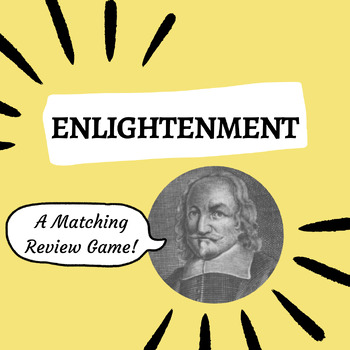Enlightenment Philosophy & Philosopher Review - Matching / Categories Game
Description
Locke, Hobbes, Rousseau, Wollstonecraft, Voltaire, Montesquieu, Kant, Beccaria, Staël, Condorcet. All your favorite Enlightenment Philosophers are here!
This is a resource you can use to help students review before the unit test or final exam. It also functions as a fun bridge between the topics of the Enlightenment, revolutions of the 18th and 19th centuries, and/or modern democracy.
Learning Objectives: Students will be able to...
- Understand the major philosophical concepts of the Enlightenment.
- Identify key historical figures.
- Paraphrase 18th-century language.
- Categorize and explain principle ideas of the Enlightenment like rationalism, progress, natural rights, and contractual government.
- Compare and contrast the theories of prominent Enlightenment thinkers.
This resource is comprised of 80 cards (40 philosopher cards and 40 quotation cards). You can use them in myriad ways, the most straight-forward being to have students match each quotation to its source, one of the following ten Enlightenment philosophers: Locke, Hobbes, Rousseau, Wollstonecraft, Voltaire, Montesquieu, Kant, Beccaria, Staël, Condorcet.
It is not necessary to use all the quotations from all ten philosophers included in this resource. Pick and choose according to what you’ve covered or want to emphasize in class.
The occassional thematic overlap of Enlightenment philosophers' main ideas may lead to some disagreement among students about which quotation belongs to which philosopher. This disagreement will generate some interesting discussion that will aid in achieving perhaps the most important content objective of the activity, fortifying student understanding of Enlightenment philosophy in general, regardless of who came up with each concept or famous line.
Some of the main themes championed by each philosopher:
Mary Wollstonecraft
- Women’s rights
- Importance of women’s education
Thomas Hobbes
- Human nature tends toward violence - people need protection from one another
- Absolute monarchy is the best form of government
Montesquieu
- Separation of powers
- Checks and balances
Jean-Jacques Rousseau
- Admiration of man’s natural state (freedom)
- Social contract
Voltaire
- Supremacy of reason
- Deism
Cesare Beccaria
- Humane justice system
- Punishment as a deterrent rather than retributive justice
John Locke
- Government’s obligation to protect natural rights of life, liberty, and property
Nicolas de Condorcet
- Natural laws, which humans are theoretically capable of quantifying, dictate human nature
- Women’s rights
Immanuel Kant
- Supremacy of reason
- individualism
Madame de Staël
- Social progress
- Regulation of power
Number of Cards: 80 cards (40 philosopher cards and 40 quotation cards)
Grade levels: 6th, 7th, 8th, 9th, 10th, 11th, 12th
Topic: Enlightenment Philosophy & Philosophers
How long it takes: 20-45 minutes
Required Materials:
- printer to print cards
- scissors to cut cards out
- optional: laminator to make the cards last longer
- a flat space big enough for students to lay all the cards out
- optional: student notes from the unit to which they can refer if necessary
Relevant Standards (US National and California)
NATIONAL STANDARDS IN WORLD HISTORY
- Era 6 Standard 2E
- Era 7 Standard 4C
Standards in Historical Thinking Standards 2, 3, 5
Reading Standards for Literacy in History/Social Studies 6—12
- CCSS.ELA-Literacy.RH.11-12.1
- CCSS.ELA-Literacy.RH.9-10.4
- CCSS.ELA-Literacy.RH.9-10.9
If you like this resource...
- leave a review (it helps other teachers find the resource and gets you some TPT credits!)
- follow me on TpT
- sign up for my newsletter
- check out some of my other resources:
Enlightenment Philosophers warm ups to complement the rest of your Enlightenment coverage
Forms of Government warm ups for questions about different types of government (Democracy, Oligarchy, Autocracy, Anarchy)
Democracy warm ups for questions that focus on desirable qualities in leaders and citizens, civil rights, liberty and equality, the overlap of government and economics, and the strengths and weaknesses of democracy
Justice warm ups for questions regarding criminal, social, and distributive justice as well as the general concept of fairness





